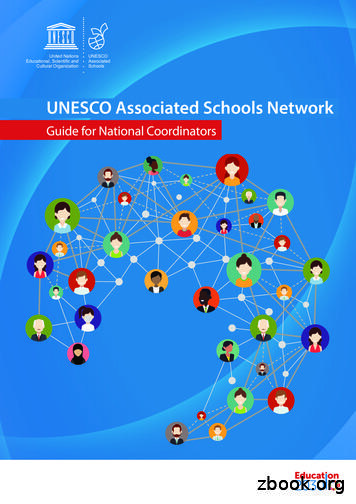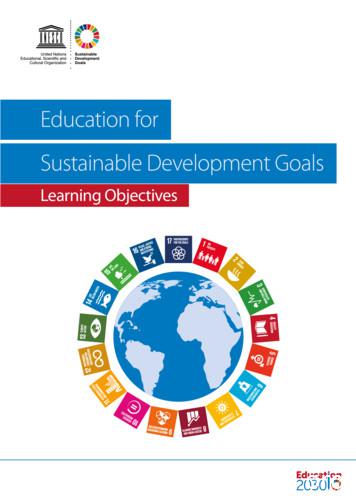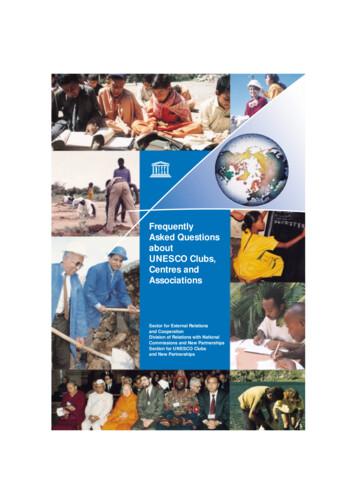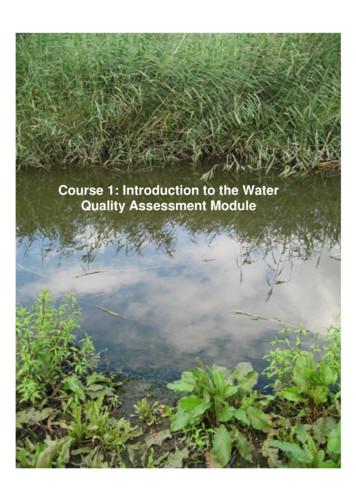Learning Assessment At UNESCO
United NationsEducational, Scientific andCultural OrganizationSustainableDevelopmentGoalsLearning assessment at UNESCOEnsuring effective and relevant learning for all@Shutterstock/Click Bestsellers
Learning in a rapidly changing worldThe fast changing and increasingly interconnected and interdependent world in which welive poses new challenges and offers new opportunities for ensuring sustainable, humanand social development. At the heart of these processes of transformation is learning.Learning is both the process of acquiring or developing knowledge, skills and attitudes allunderpinned by values, as well as the result of that process. While learning can be deliberate,intentional, purposeful and organized, it is also often much less institutionalized and maytake place in various activities of daily life, in the work place or non-formal educationprogrammes, in the local community, on a self-, family- or socially-directed basis.1An integrated approach to learningAs part of its humanistic tradition, UNESCO supports an integrated approach to learningthroughout life - one which is relevant to the various dimensions of personal and collectivehuman development. It is a holistic approach which attempts to balance and integratethe social, economic, cultural, ethical, environmental, spiritual, political and other purposesof education. This integrated approach is well captured in the four pillars of learning –learning to know, to do, to be and to live together - and is arguably even more relevantfor sustainable human and social development in today’s rapidly changing world. This isreflected through the growing interest in areas such as intercultural learning, digital medialiteracy and global citizenship education. enewed focus on equitable quality learning for allRby 2030@Shutterstock/NatinkaEducation 2030 has refocused attention on learning, as echoed in Sustainable DevelopmentGoal 4, which aims to “ensure inclusive and equitable quality education and promotelifelong learning opportunities for all.”2 The goal implies effective acquisition of foundationaland transferrable skills as the basis for learning throughout life, as well as a focus on tothe relevance of learning - both for the world of work, and for personal, civic and sociallife. This focus has implications in areas that are critical to improving learning processesand outcomes. These include teacher education, training and professional development,curriculum development, and the design of teaching and learning materials, as well aslearning assessment.1 See UNESCO. 2015. Rethinking Education: Towards a global common good?. Paris, UNESCO.2 See UNESCO. 2016. Incheon Declaration and Education 2030 Framework for Action. Paris, UNESCO.
Learning assessment to enable learningLearning assessment is part of evaluating and monitoring education more broadly. It refersto a wide range of methods and tools used to evaluate, measure and document learningoutcomes and learning progress. It is about gathering information from multiple sourceson what learners know and what they can do with what they have learnt. It also providesinformation on the process and context that enable learning, as well as those that may behindering the learning process.Learning assessment can address the needs of a range of actors – including learners andtheir families, teachers and school-administrators, policy and decision makers, donors andsociety. It generally serves at least one of the following purposes: Certifying and validating learning: at the system-level, summative assessment (orassessment of learning) is used to certify or select learners for a given grade or age,for further education, training or for work. Providing an evidence base for policy development: it provides evidence formonitoring, policy-making, planning and programme design. Ensuring accountability for results: it enhances accountability, transparency andbetter governance among a range of stakeholders (families, communities, teachers,ministries, employers, civil society groups and donors). Informing teaching and learning practice: from a pedagogical perspective, itserves to inform teaching and learning practices. Often referred to as assessmentfor learning, it generally focuses on the use of formative assessment strategies. Italso helps learners identify their strengths and areas that need improvement, andmotivates them to learn in sustainable ways, including through self-assessment, orassessment as learning.Learning assessment is therefore not an end in itself. Regardless of its purpose, scope,object or nature, it is conducted with the ultimate goal of improving equity and learning forindividuals, communities and society.UNESCO network for learning assessmentA network comprised of UNESCO sectors, specialized institutes, as well as regional andcountry offices supports Member States in areas that are critical to improving learningprocesses and outcomes such as curriculum, pedagogy, teacher training, and assessmentsystems. The activities address a range of assessment issues, for learners of all ages, in abroad range of domains, in both formal and non-formal settings.The types of support and activities undertaken on learning assessment reflect the UNESCO’score functions in standard setting, capacity development, knowledge sharing andcooperation. These include: Supporting direct assessment of learning outcomes Knowledge sharing and building networks for planning, design and use of learningassessments Providing a space where issues can be openly discussed and debated to identify andaddress country needs for improving the quality of their education systems
Strengthening individual and institutional capacity through training and tailoredtechnical assistance Consolidating and standardizing existing data for monitoring progress at national,regional and global levels Producing research to inform policies and strategies for improving learning andequityThrough coordinated efforts, the network strengthens coherence and cooperation at national,regional and international levels and supports Member States in translating the Education2030 commitments into strategies for improved equity and learning outcomes for all.Global initiativesI n-Progress Reflections on Current andCritical Issues in Curriculum, Learning andAssessmentUNESCO International Bureau of Education Learning Portal UNESCO International Institute forEducational PlanningGlobal Observatory for the Recognition,Validation and Accreditation ofNon-formal and Informal LearningUNESCO Institute for Lifelong learningGlobal Alliance to Monitor LearningUNESCO Institute for Statistics easuring Global Citizenship Education &MEducation for Sustainable DevelopmentUNESCO Education SectorRegional networksNetwork on Education Quality Monitoringin Asia-PacificLatin American Laboratory for Assessmentof the Quality of EducationAfrica’s Teaching and Learning Educators’Network for Transformation
A selection of publications on learning assessmentMore than one-half of childrenand adolescents are not learningworldwideAnalyzing and Utilizing AssessmentData for Better Learning OutcomesMeasuring Early Learning Quality andOutcomesMonitoring Progress towards SDG 4.1: Assessment of TransversalInitial Analysis of National Assessment CompetenciesFrameworks for MathematicsThird and sixth grade teachers inLatin America and the CaribbeanTen notes on learning assessmentsystemsTERCE: Gender inequality in learningachievement in primary educationAction Research: Measuring LiteracyProgramme Participants’ LearningOutcomesRegional mapping report onassessment in the Arab StatesGlobal Media and InformationLiteracy Assessment FrameworkSmaller, Quicker, Cheaper: Improvinglearning assessments for developingcountries
UNESCO Education SectorThe Global Education 2030 AgendaEducation is UNESCO’s top priority becauseit is a basic human right and the foundationon which to build peace and drive sustainabledevelopment. UNESCO is the United Nations’specialized agency for education and theEducation Sector provides global andregional leadership in education, strengthensnational education systems and respondsto contemporary global challenges througheducation with a special focus on genderequality and Africa.UNESCO, as the United Nations’ specializedagency for education, is entrusted to lead andcoordinate the Education 2030 Agenda, which ispart of a global movement to eradicate povertythrough 17 Sustainable Development Goals by2030. Education, essential to achieve all of thesegoals, has its own dedicated Goal 4, which aimsto “ensure inclusive and equitable quality educationand promote lifelong learning opportunities for all.”The Education 2030 Framework for Action providesguidance for the implementation of this ambitiousgoal and commitments.This brochure was prepared collaboratively by colleagues from the UNESCO Education Sector, includingfrom the Regional bureaux (Bangkok, Beirut, Dakar and Santiago) and the following institutes: UNESCOInternational Bureau of Education, UNESCO International Institute for Educational Planning, UNESCOInstitute for Lifelong Learning, and UNESCO Institute for Statistics.For more information:Section of Partnerships, Cooperation and ResearchDivision for Education 2030 Support and CoordinationUNESCO7, place de Fontenoy75352 Paris ing-assessment@Education2030UN
This brochure was prepared collaboratively by colleagues from the UNESCO Education Sector, including from the Regional bureaux (Bangkok, Beirut, Dakar and Santiago) and the following institutes: UNESCO International Bureau of Education, UNESCO International Institute for Educational Planning, UNESCO
The UNESCO -IHE Institute for Water Education (UNESCO -IHE) became part of the UNESCO Water Familyduring the 31 st session of the UNESCO General Conference in October 2001 and started its operations in June 2003. Before becoming a UNESCO Category I Institute, UNESCO -IHE
UNESCO Office, Jakarta Publications 2006-2007 UNESCO Office, Jakarta www.UNESCO.or.id Jl. Galuh II no 5. Kebayoran Baru. Jakarta 12110 Tel: 62-21 7399818. Fax: 62-21 72796489 Email: Jakarta@unesco.org UNESCO Librarian : Rosinta P. Hutauruk (rp.hutauruk@unesco.org ) Basic Sciences (BSC) -2007 / 2006 Coastal and Small Island -2007 / 2006
4 Resolution 1.341, 7th session of the UNESCO General Conference, 1952 5 Document UNESCO/ED/149 of 4 February 1957 6 Document ED/MD/19, 1971 7 UNESCO's Associated Schools Project Network (ASPnet) - List of Participating Institutions, UNESCO 1997 8 Approved Programme and Budget for 1998-1999, Document 29 C/5, Paragraph 06028, UNESCO, 1998 1 1
Designed and printed by UNESCO Printed in France UNESCO Education Sector Education is UNESCO’s top priority because it is a basic human right and the foundation on which to build peace and drive sustainable development. UNESCO is the United Nations’ specialized agency for education and the Education Sector provides global and
that appeal, the UNESCO Clubs movement gradually spread throughout the world. In 2001, there were more than 5,000 clubs* in more than 120 countries. *The term UNESCO Club is the one most frequently used, although several countries choose to call them UNESCO associations, centres, circles, or friends of UNESCO. They all refer to the same type of .
1 Call for Proposals on School-wide Mobile Learning Models UNESCO-Fazheng Project on Best Practices in Mobile Learning The UNESCO-Fazheng Project on Best Practices in Mobile Learning is designed to seek evidence-based school-level mobile learning practices to inform policy makers and practitioners about the lessons learned on planning and implementing school-wide mobile learning programmes.
1.2. UNESCO-IHE Institute for Water Education (source: www.unesco-ihe.org) The UNESCO-IHE Institute for Water Education is established in 2003. It carries out research, education and capacity building activities in the fields of water, environment and infrastructure. UNESCO-IHE continues the work that began in 1957 when IHE first
defines adventure tourism as a trip that includes at least two of the following three elements: physical activity, natural environment and cultural immersion. It’s wild and it’s mild The survey also asked respondents to define the most adventurous activity undertaken on holiday. For some people, simply going overseas was their greatest adventure whilst others mentioned camping in the .























